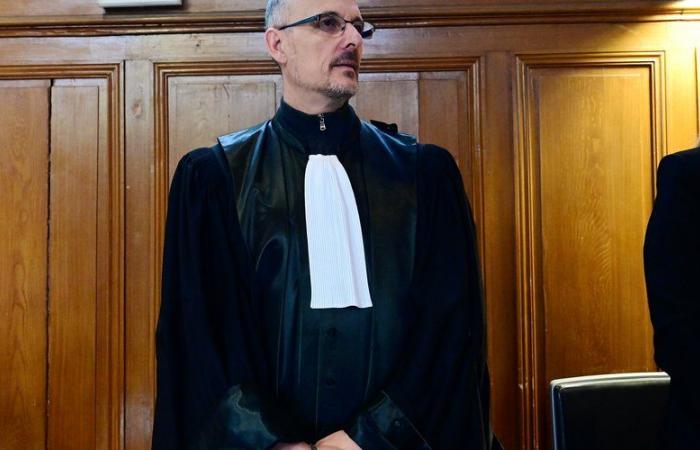
Six and a half years after stabbing his ex-partner six times, Stéphane San Emeterio was sentenced to 14 years of criminal imprisonment. Lise-Marie Gil, for her part, received a one-year suspended prison sentence.
After two days of hearing to judge Stéphane San Emeterio, 31 years old, and Lise-Marie Gil, accused of violence with the use of a weapon followed by permanent disability for the first and of complicity in this act, for the second, the jury has returned its verdict.
Author of six stab wounds on Sabbah B., his ex-partner, hitting a femoral artery, on 1is May 2018 in the parking lot of a residence in Narbonne, Stéphane San Emeterio then returned to the vehicle of Lise-Marie Gil, who had accompanied him to Béziers station, where the latter had come to pick him up at the beginning of the day. -noon, that same day.
Also read:
Assises de l’Aude: he travels 800 km to stab his ex-partner multiple times in Narbonne
The expert assessments on the personality of the two co-defendants allowed the jurors to know more about their motivations and aspirations in life. When the time for the pleadings arrives, Maître Isabelle Fornairon, lawyer for the civil parties, opens the ball, as is customary.
“The accused increased his requests for release, going so far as to contest the permanent disability of Sabbah B., before abandoning him todaynotes the victims’ lawyer. She has had to live with this disability for six and a half years, had to learn to walk again and thinks about it every day… Has Mr. San Emeterio thought about it during the last six years?”
“If he had wanted to kill her, he would have finished the job”
Maître Fornairon also insists on the position of control which his client tried to get rid of by leaving the Paris region and her companion to return to Narbonne and the parental home: “A difficult but vital choice.”
The Attorney General, Maître Eric Camous, then returns in his requisitions to a question which agitated the three days of hearing: the reclassification of the facts from “attempted assassination” to “violence with use of a weapon followed by ‘a permanent infirmity’.
“She should have died without her friend’s intervention.launches the public prosecutor of Narbonne. No one could stop Mr. San Emeterio, with his mace, if he wanted to kill her he would have finished the job… but he left.”
The Public Prosecutor’s Office requires a sentence of 14 years in prison for Stéphane San Emeterio, and three years in prison, including one year for his accomplice Lise-Marie Gil.
The first defense lawyer to speak, Maître Rémy Garcia, counsel for Ms. Gil, believes that the latter is “wrongly accused” in this matter, while not forgetting that “the facts are extremely serious”.
An alteration of discernment?
“But if a man with the build of Mr. San Emeterio gets into my car and says “I planted it, start”, I do what he asks me, so imagine Mrs. Gil, and the difference in size between the two”adds the lawyer before the court, requesting an acquittal for his client, “with no criminal record despite setbacks in her personal life, she tried to bounce back and is now a nurse.”
The last argument, that of the main accused in this case, Stéphane San Emeterio, is led by Maître Virginie Manzi. “14 years is a disproportionate sentence.”she argues, relying on the numerous expert reports concerning her client’s intellectual and cognitive abilities. “Psychiatrists have been able to speak of an alteration of discernment (Editor’s note: Mental disorder that reduces control or scope of actions at the time of the events)“continues the lawyer.
Article 122-1 of the Penal Code indicates that: “A person who was suffering, at the time of the facts, from a mental or neuropsychic disorder having abolished their discernment or control of their actions is not criminally responsible.” Without being abolished, the simple alteration of the accused’s discernment would be enough, according to the defense, to reduce the length of the sentence, which it proposes mixed, coupled with treatment.to avoid the risk of recurrence.”
One year suspended prison sentence for Ms. Gil
To close the debates, the president invites the two accused to say a last word on the stand. “I am not a bad person, I was just in the wrong place at the wrong time, in no way did I order this act, I was scared and tried to save with my life”implores Lise-Marie Gil, sobbing.
Stéphane San Emeterio, whose voice is not as imposing as his build, whispers regrets to him in front of the jurors: “I would like to ask for forgiveness from the victim’s family, as well as the victim, I thank her friend for being there to save her life. I am sorry.”
After deliberation, President Eric Emmanuelidis informs the accused of the court’s decisions. In the box, Stéphane San Emeterio is found guilty of the facts with which he is accused and sentenced to 14 years of criminal imprisonment, accompanied by a ban on coming to Aude for 10 years and a ban on working in the public service, following the requisitions of the attorney general. He shows signs of emotion for the first time in three days, when the sentence is announced.
Lise-Marie Gil received a one-year suspended prison sentence, and emerged from the court free, encouraged by the court to “continue his professional development.





